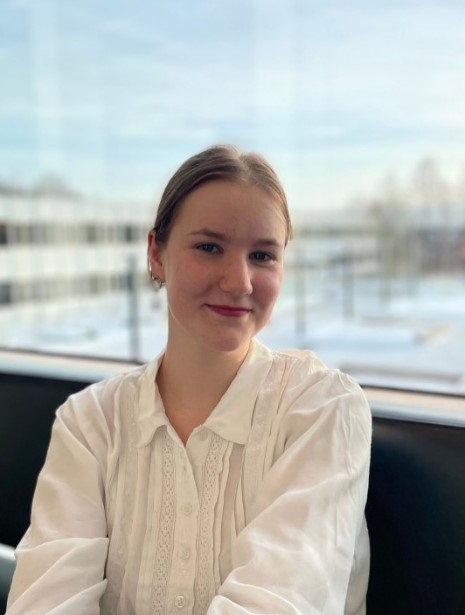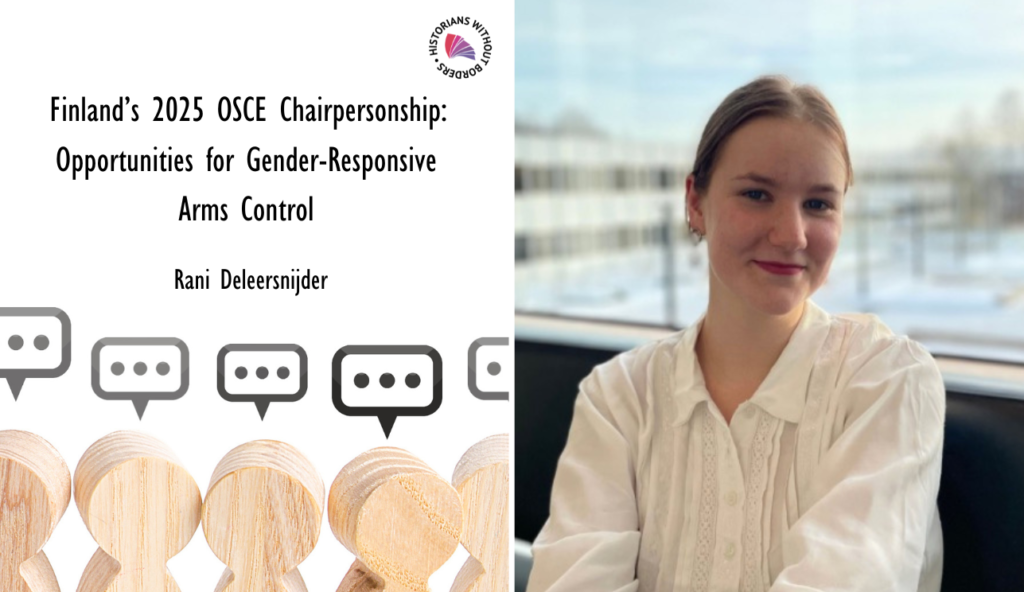As a final section of the OSCE by All project, Historians without Borders in Finland has curated a student policy-recommendation paper series in support of the 2025 Finnish Chairpersonship. The series looks at the OSCE’s added value in the European security architecture, as well as Finland’s engagement with the OSCE. This first paper in the series is written by Rani Deleersnijder.
The article can be downloaded as a pdf document through the button below. Endnotes are marked in the document.
Finland’s 2025 OSCE Chairpersonship: Opportunities for Gender-Responsive Arms Control
An Analysis of Gendered Dimensions of Small Arms Control in the Western Balkans
Rani Deleersnijder
Policy Recommendations:
To facilitate greater comprehensive security in Small Arms and Light Weapons (SALW) work, Finland as OSCE Chairperson in 2025 should Listen, Co-operate, Merge, and Think Ahead:
- Listen: low-threshold workshops to map concerns around small arms abuse and raise awareness around the gendered dimension of gun ownership and misuse.
- Co-operate: strengthen ties with regional and local organisations working with a gender perspective on gun small arms proliferation and misuse.
- Merge: towards intersectional, and comprehensive security. Low-threshold initiatives cross-cutting OSCE dimensions (political-military, environmental and economic, and human rights) would support work towards an intersectional, gender-sensitive arms control policies.
- Think Ahead: structural, patriarchal gender norms must be addressed in security policies as they negatively impact the ownership and misuse of small arms.
Finland as OSCE (Organization for Security and Co-operation in Europe) Chairperson-in-Office for 2025 stresses resilience as one of its core themes.i This paper will explore one specific aspect of resilience: resilience against arms proliferation. The OSCE has historically been active on this topic within the region of the Western Balkans. According to estimations of civilian-owned firearms per 100,000 inhabitants by Small Arms Survey (SAS), five countries in the Western Balkan rank in the top 25 worldwide.ii The OSCE is a key actor in the region, with one-third of the OSCE Practical Assistance Projects on small arms and light weapons (SALW) focusing on the Western Balkans.iii
This report will stress the gendered dimensions of SALW and encourage intersectional approaches to policy to strengthen resilience and security for everyone, regardless of gender. Taking a feminist peace perspective, this report stresses how gender influences security against gun violence.iv The OSCE is an opportune platform to implement and perform gender-responsive arms control as gender is recognised in the OSCE’s work on arms control and issues of equal representation.v
Four policy recommendations for Finland and the OSCE are organised around the following themes: listen, co-operate, merge and think ahead. 1) Listen – to the concerns of people in the area projects are aimed at. 2) Co-operate – with organisations working on the same issues in the region. 3) Merge – practices of arms control and gender equality. 4) Think ahead – about long-term consequences of small arms after the formal end of conflict affecting genders differently.
As security policies increasingly prioritise hard security measures, it is vital to address the long-term, sometimes negative societal impacts these hard measures have. The Finnish chairpersonship of the OSCE and the opportunity to chair the Forum for Security Co-operation in the final trimester of 2025 offers space to further integrate an intersectional, long-term approach to arms control.
The legacy of conflict: Gendered dimensions of small arms in the Western Balkans
The presence of small arms in the Western Balkans stems from the Yugoslav Wars of the 1990s.vi Despite ongoing efforts of small arms control and reduction of surplus stock, many weapons and their ammunition, trafficked during the Yugoslav Wars, remain in circulation in the region.vii This resulted in a continued struggle with illegal possession, trafficking, and misuse of firearms.viii
The OSCE is active in combating small arms trafficking and misuse in several countries in the region.ix The OSCE involvement started after the Yugoslav Wars. In Bosnia and Herzegovina (BiH), for example, the organisation has been active since 1995. The SALW mission in BiH was created to aid and secure the implementation of the General Framework Agreement for Peace in Bosnia and Herzegovina.x The OSCE works together with the authorities and the United Nations Development Programmes’ South Eastern and Eastern Europe Clearinghouse for the Control of Small Arms and Light Weapons (SEESAC) to strengthen resilience against gun violence.
Research by SEESAC highlights policy shortcomings in addressing the gendered nature of SALW, which results in gender-specific risks related to gun violence.xi Men make up the vast majority of SALW owners, perpetrators, and victims across the region, but women disproportionally fall victim to domestic violence.xii The presence of a gun in the house vastly increases the risk and lethality of domestic violence.xiii A person’s gender is thus an important factor in when and where one might encounter armed violence. These are factors SALW policies need to better incorporate if truly resilient societies are to be supported.
Towards a resilient future: Policy pathways for gender-responsive arms control
How can the OSCE support action against these gendered dimensions of gun violence? From existing efforts of the OSCE’s involvement in the Western Balkans, four recommendations were drawn to embed an intersectional approach in arms control programmes.
Listen – First, in order to gain an overview of the experiences and feelings of insecurity, it is crucial to listen to the general public. To this end, a workshop by the OSCE in Bosnia and Herzegovina is a suitable example.xiv In order to reach the wider population, media outlets were invited to participate. It is recognised that the media could form a bridge of communication and help in increasing awareness and security among civilians. This workshop made no mention of gender or any intersectional aspect of small arms. However, it did recognise the importance of – and willingness to reach out and listen to – civilians. Awareness of the gendered nature of small arms and help for those affected by Gender-Based Violence with the misuse of small arms could be raised in a similar manner by other OSCE institutions, such as the OSCE Parliamentary Assembly.
Cooperation – The OSCE already works with organisations such as SEESAC in the region. Attention to gender is directly mentioned in The Roadmap for a Sustainable Solution to the Illegal Possession, Misuse and Trafficking of Small Arms and Light Weapons, their Ammunition and Explosives in the Western Balkans by 2030, a regional agreement supported by the EU also working towards resilience against gun violence.xv Increased OSCE cooperation with the UN, EU, as well as civil society, will further develop active efforts towards gender-responsive arms control.
Merge – Next, advancing intersectional approaches towards arms control can also take place within projects established by the OSCE. While both arms control and violence against women are objectives of the OSCE, only an integration of these issues will lead to comprehensive advancement. More security for everyone requires including factors such as gender in arms control policies. Gender is seen as a cross-cutting dimension, which means it is of relevance to all three OSCE dimensions: politico-military, economic and environmental, and the human dimension. While the importance of inter-dimensional security, and attention to gender, has been addressed, it has not been fully implemented. To enhance resilience against gun violence for all, an intersectional perspective should also be present in the first dimension, which deals with arms control. Small initiatives, such as the workshop described above, could kickstart the integration of intersectional approaches to security-building.xvi Finland, as an advocate for inclusive practices of peacebuilding, has the opportunity to include an intersectional lens and lead such projects in the coming year.
Think Ahead – Small arms are an example of the long-term consequences of violent conflict. Violence does not disappear but rather transforms. Domestic violence for example often increases after conflict.xvii Issues of such continuums of violence should be at the centre of policy frameworks and activities around small arms. In order to build resilient and comprehensive policy frameworks and actions to combat SALW issues, the underlying structures of patriarchal gender norms and differentiated risks of SALW abuse related to gender must be recognised, addressed, and taken seriously.
Comprehensive resilience: Towards a more inclusive security approach in 2025
As a recognised advocate for peacebuilding, Finland’s chairpersonship of the OSCE in 2025 provides an opportunity to push for a nuanced balance between soft and hard security. In its priorities, Finland has emphasised resilience, a comprehensive approach to security, a commitment to the core principles of the OSCE, gender equality, and the strengthening of operational capacity. All these aspects form a promising framework to work towards nuanced and resilient decision-making processes, which enhance both global and grassroots security outcomes.
Gender has historically been a controversial issue in the OSCE. However, it was over 20 years of continued advocacy that allowed human rights to gain a common home in OSCE politics. As such, The Women of the First Dimension, could be one advocacy group to support the continued inclusion of gender in OSCE SALW projects.xviii Finland should capitalise on the opportunity of their chairpersonship to further integrate the intersectional, complex linkages between SALW and gender within the fieldwork and objectives of the OSCE.

Rani Deleersnijder is a master’s student in Peace, Mediation, and Conflict Research at Tampere University, with a bachelor’s degree in Political Science from Ghent University. She specialises in Feminist Peace Research, which aims to uncover structural and intersectional inequalities in the world and highlights traditionally marginalised voices. This report draws on her ongoing master’s thesis research, which examines the relationship between small arms and light weapons (SALW) and gender-based violence in Kosovo. The feminist peace approach of her research seeks to uncover the gendered dimensions of gun violence and introduce new research questions and policy approaches to address SALW violence.
rani.deleersnijder@tuni.fi
This report represents the views of the authors and does not reflect the institutional position of Historians without Borders in Finland.
This series of articles was produced as part of the OSCE by All project in collaboration with the Tampere Peace Research Institute, the University of Turku, the University of Helsinki, and the Finnish Ministry of Foreign Affairs.


